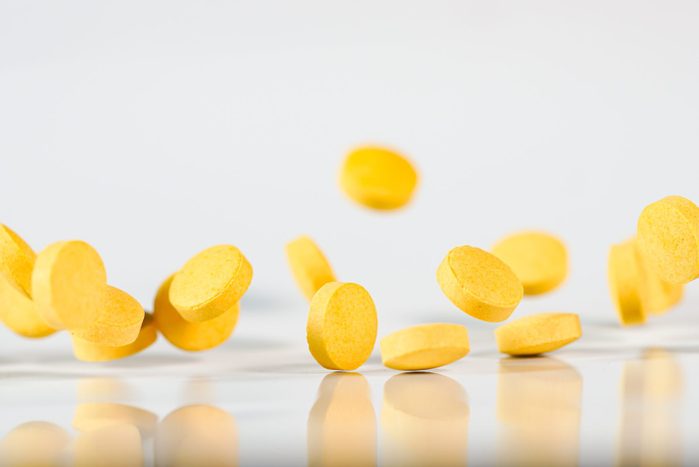
You are what you eat—and we don’t mean only in the way your body feels. There’s a growing link between food and mood, and research, such as a 2020 study in the British Medical Journal, shows that diets rich in whole, unprocessed foods support not just better health but an overall sense of well-being. Just as an example, you know the “hangry” feeling? “Low blood sugar can contribute to poor mood, irritability, and lack of energy,” says Elise Museles, certified eating psychology nutrition expert and Nature Made wellness ambassador—so it’s important to eat regular meals that have a balance of foods like carbohydrates, proteins, and healthy fats.
Also, says Museles, when healthy meal-planning gets tricky, mood-boosting supplements can offer extra support. So Museles, along with fellow nutrition and mental health specialists, share their favorite, science-backed mood-boosting supplements with The Healthy @Reader’s Digest—but remind you to always check with your doctor first before adding a new supplement to your diet.
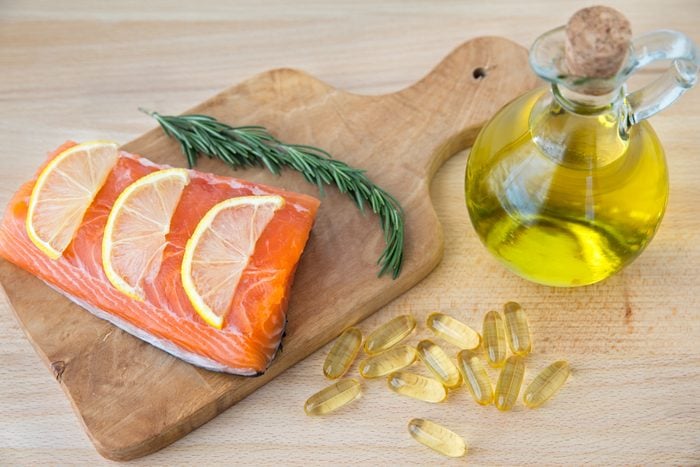
Omega-3 Fish Oil
“About 60% of your brain is made of fat,” Museles says. “So, it’s no wonder that good-for-you fats, especially those rich in omega-3 fatty acids, are crucial for optimal brain function and mood, improving neurotransmitter activity and lowering inflammation.”
You can get omega-3s from food sources like walnuts, flaxseeds, avocados, and salmon—but taking a fish oil supplement can help make sure you’re getting (and absorbing) enough of this mood-regulating nutrient, she says.
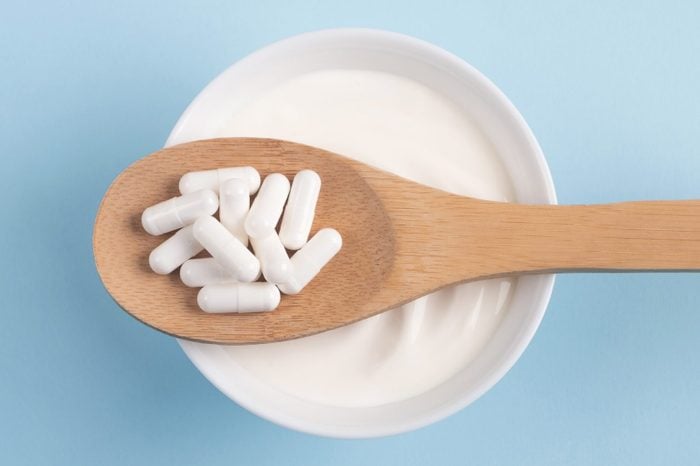
Probiotic
Your brain and your gut are closely connected through extensive interconnected pathways, collectively known as the brain-gut axis, says Jeff Gladd, MD, an integrative medicine physician and the chief medical officer at Fullscript. “Interestingly, the gut microbiota has the ability to produce neurotransmitters that can influence your mood and stress responses.”
For instance, says Museles, having enough “good” bacteria in your gut is key for producing serotonin—also known as the happiness hormone. “Alternatively, poor gut health is associated with chronic inflammation throughout the body, which is in turn overwhelmingly associated with mood swings, anxiety, and depression.”
In addition to eating lots of colorful plants that are high in fiber and probiotic foods, taking a probiotic supplement can help ensure you’re feeding your gut with the good bacteria it needs. Some probiotic strains have been shown to play a stronger role in maintaining a healthy gut-brain axis, says Dr. Gladd—so check product labels for strains like Lactobacillus rhamnosus R0011, Lactobacillus helveticus R0052, and Bifidobacterium longum NCC3001/R0175. (Also read Healing My Gut with Probiotics Relieved My Depression: I Tried It)
Types of Probiotics and How to Pick the Right One for Your Needs, according to Gut Health Research

Vitamin D
Vitamin D and mood regulation go hand-in-hand. Dr. Gladd says low vitamin D levels are associated with higher incidences of depression, seasonal affective disorder, fatigue, and anxiety, among a host of other health concerns.
A lack of vitamin D is “one of the most common nutrient deficiencies I see in my practice,” Dr. Gladd adds. (And here are the 4 best vitamin D supplements, according to nutrition experts.)
Dietitians Just Shared 6 Tips to Help Your Gut Absorb Vitamin D
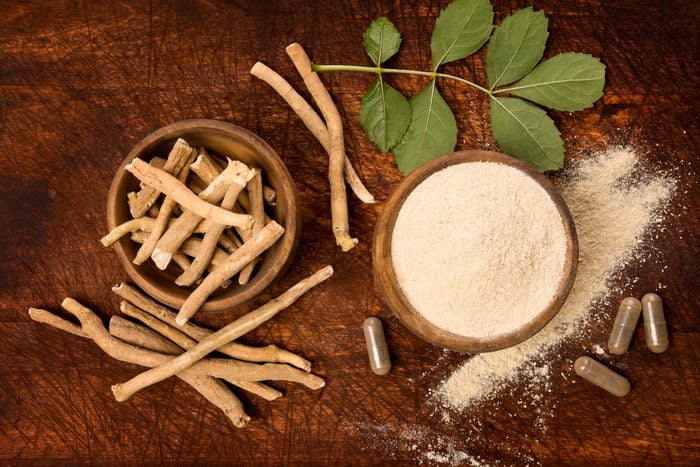
Ashwagandha
Ashwagandha is an herb that’s an important component of Ayurveda, the centuries-old traditional medicine methodology in India. Ashwagandha’s health benefits are many, and are supported by scientific research—but among its most notable effects is its ability to soothe the central nervous system and stress response.
This herbal supplement is what’s referred to as an adaptogen, Museles explains, which means it can adapt to your body’s stress levels. And 2019 research published in the journal Medicine demonstrated that people who took ashwagandha had lower levels of stress hormones, like cortisol, and felt less anxious and depressed.
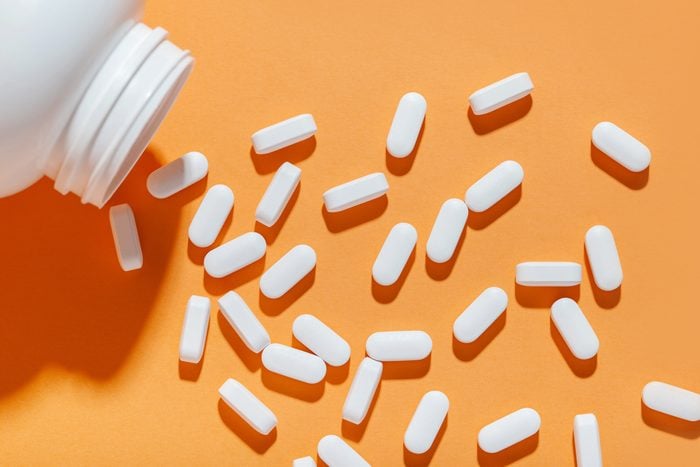
Magnesium
“Magnesium, also known as the anti-stress mineral, is an essential nutrient that many adults don’t get enough of in their diet alone,” Museles says. She recommends choosing a product with magnesium glycinate, a form of the mineral that’s most easily absorbed by the body. “This is an excellent way to wind down in the evening, since magnesium can help promote relaxation and better sleep,” she says.
Can’t Sleep? A New Study Found This Solution Was More Powerful Than Melatonin
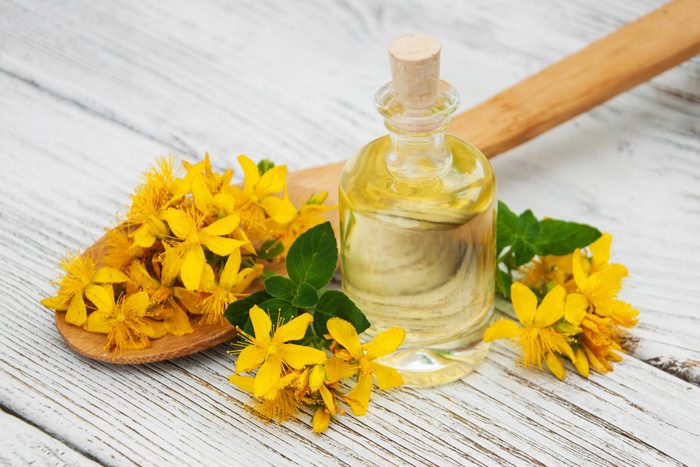
St. John’s Wort
St. John’s Wort is a supplement that may help with low moods, mild anxiety, and mild symptoms of depression, says Emma Loker, a mental health specialist from Healthy Minded. While the exact way St. John’s Wort works to support mood is not fully understood, “researchers propose that this supplement acts on the serotonin, dopamine, and norepinephrine neurotransmitters in the brain, which are involved in mood regulation,” she says. “Various studies suggest that St. John’s Wort might prevent the breakdown of these neurotransmitters, increasing their levels in the body and potentially improving mood.”
A word of caution, however: like many herbal supplements, St. John’s Wort can interact with prescription medications, like selective serotonin reuptake inhibitors (SSRIs)—so once again, it’s important to always check with your doctor before adding a new supplement to your routine.
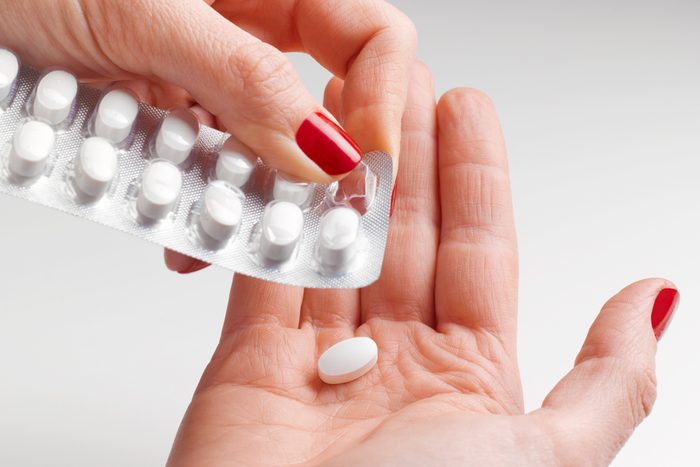
SAMe (S-Adenosylmethionine)
SAMe is a compound our bodies naturally produce to make those happiness neurotransmitters like dopamine and serotonin, Loker says. While more research is needed to hone in on SAMe supplements’ potential to keep our moods in great shape, a 2020 review of studies published in Annals of General Psychiatry noted that existing research has shown encouraging and generally positive results.
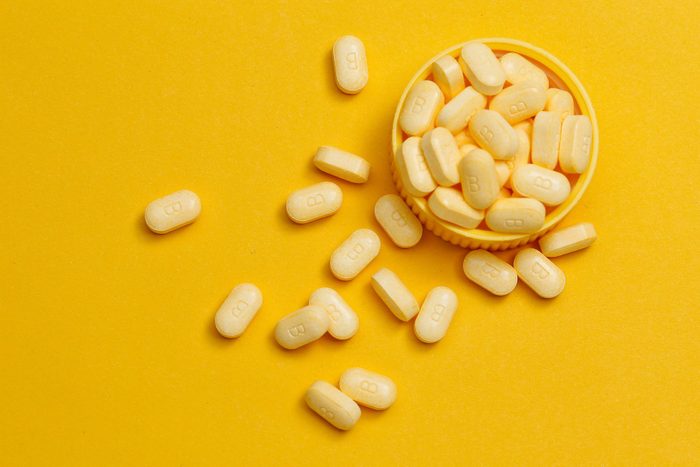
B-Complex
B vitamins play many roles in your body, and two of their major jobs are to convert your food into cellular energy—warding off fatigue and crankiness—and supporting the normal functioning of your central nervous system, Museles says.
Low levels of B vitamins such as B-12 and folate have been linked to higher rates of depression (and these are two deficiencies Dr. Gladd says he also commonly sees in his practice). And a recent review of studies published in Nature found evidence that supplementing with B vitamins can help relieve stress and low moods (but the study authors note that benefits are limited for people with clinical depression or anxiety).
